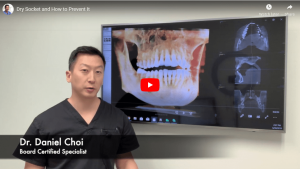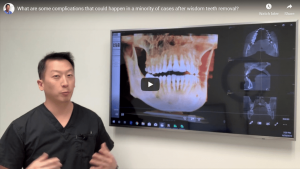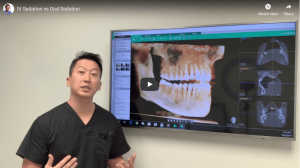Wisdom Teeth Complications
If you’re ready to have your wisdom teeth removed, I highly recommend learning about the potential risks and complications with the procedure. So, first and foremost, I am not discussing this because I am trying to scare anyone, but because it is important to be well informed heading into this procedure. These are just potential risks and complications, which more than likely will not affect the majority of people. In the off chance that these complications occur, it is always best to be prepared going into the procedure knowing about the potential risk factors.
The first thing I would say is, do you really need to have your wisdom teeth removed? To be completely honest, not everybody needs to get their wisdom teeth removed. However, in my career, I have done wisdom teeth extractions pre-teens as young as 12 years old and I have done wisdom teeth extractions on individuals up to 85 years old. So there is a pretty dang good chance that you will have to get your wisdom teeth extracted at some point in your life due to the teeth bothering you and / or causing pain. And if that’s the case, then you definitely want to get your wisdom teeth removed when you’re younger versus getting your wisdom teeth out anytime you’re older than over 30. This is simply because of the way the human body heals and the way the wisdom teeth grown. Chances of complications increase when the patient is older.
That being said, there are certain things that need to be evaluated as every person is different and no one case is the same. That is why I always recommend going in for a consultation. When choosing a potential provider, always ensure that your surgical specialist has 3D technology to be able to comprehensively evaluate your specific potential risks, complications, and factors that may exist with getting your wisdom teeth removed.
So you might be wondering, what are some of these surgical complications? So, first and foremost, I have a list here to go over that is actually from our consent form. Keep in mind that there is a very minute chance that these potential complications will arise.
Swelling and bruising
The most common complication experienced is swelling and/or bruising of the surgical area. The swelling or bruising may be noticeable around the cheeks and the jaw area. Remember, you are getting your wisdom teeth extracted so don’t be surprised if you do see some swelling and bruising.
Again, not every case of wisdom teeth are the same, right? Some are definitely more complicated than others, particularly when the wisdom teeth are deeply impacted. On the other hand, some are pretty simple procedures where, my patients experienced no swelling or bruising. I have had patients who thought I was an amazing surgeon because they did not swell or bruise or have any of the associated discomfort. But in all honesty, although I have done probably 10,000 cases in my career, there is nothing magical about a surgical technique that I have that made their experience so amazing. Being a teenager with wisdom teeth that are not horrendously impacted can lead to you having a much better experience without any swelling. I have also seen cases where teenagers experience a lot of swelling because they have highly impacted teeth coming in at all crazy angles with very little space in their jaws. I discuss the potential for swelling and the severity of it during the consultations when reviewing the patient’s 3D scan. Talk to your surgical specialist about potential for swelling and/or bruising that may arise and what the surgeon can do to help prevent and/or minimize swelling.
Infection
Another thing that is on our consent form is possible infection requiring further treatment. Any time you do get a wisdom tooth, or even another tooth extracted, you must keep the area as clean as possible. Your surgical specialist should go over post op instructions with you including the things that you need to do to make sure that you do not get an infection. For example, avoiding certain foods that have little seeds (like strawberries) that can get stuck in your sockets can help prevent infection. It is extremely important that when getting your wisdom teeth extracted, you follow the post op care instructions to make sure that you do not get an infection.
Dry Socket
Dry socket is another common complication that comes up during a lot of consultation. The most common thing that I’ve heard from patients in regards to what dry socket feels like, is that on a scale of 1 to 10, it’s a 12 out of 10 in regards to pain experience. We definitely do not want you to experience dry socket. Unfortunately, sometimes when patients do everything that they possibly can, they can still get dry socket. There are some things though that you can do to prevent or minimize the risk of dry socket. Patients who experience dry socket are usually smokers or they do not follow their post op instructions. For example, we advise not using straws post operatively and being gentle around the socket areas to allow the blood clot to form. Our team provides you with detailed post op instructions to make sure that you heal properly and do not develop dry socket. Hopefully, dry socket is something you do not experience! If you asked me what percentage of patients experience dry socket, I would probably say approximately 5% of our patients. The most common cause of it being that they are smokers.
Damage to adjacent teeth
Another potential complication is the risk of damage to adjacent teeth, especially those with large fillings or caps. If you have numerous big cavities in your mouth, there is always a chance that the tooth next to the wisdom tooth being removed might experience some damage. A good surgeon will look at your x-rays and let you know about the risk factors that you may have of this potentially happening. Bleeding is also mentioned on our consent form. Obviously after the procedure you will lose some blood. Once the procedure is completed, we insert gauze and advise you to bite down hard to make sure the blood is clotting before releasing you. Patients might have some gauze in their mouth when they get home and see a little bit of blood on the gauze. Do not be alarmed. That is actually totally normal. Minor bleeding is not a potential risk factor or a complication that’s going to arise from the procedure, as it is inevitable that some bleeding will occur. Incomplete removal of tooth fragments. Based on your 3D scan, there may be certain areas of the tooth root that very close to the nerve. Also, if your root formation is very curved or what we call dilacerated, you might have potential surgical complications. It is possible that we might leave a part of that tooth in, letting you know that it was not the safest thing for you if we were to remove that little tooth fragment right next to the nerve. We inform our patients after reviewing the diagnostic information about a potential risk factor for that happening.
Numbness
Possible numbness or altered sensation in the teeth, lip, tongue and chin due to the closeness of the roots, especially the wisdom teeth to the nerves, which can be bruised or injured. What we are talking about here is called paresthesia. The inferior alveolar nerve, which provides sensation to the lips, chin area, tissues, and teeth, is the most common nerve damage during wisdom teeth removal. If damage occurs to this nerve, you might feel numbness in your lip or chip, similar to the feeling of when a dentist numbed you when you are getting a filling. The lingual nerve is another area where you may experience nerve damage. That is the nerve that provides the innervation of taste. For some people, they lose taste on half of their tongue only. What are the odds that you may experience paresthesia due to nerve damage? Well, you can mitigate this risk by finding a surgeon that uses 3D technology so that they can actually see where the nerves are. They will be able to tell you where your wisdom tooth is in relation to these major nerves. Also, the surgical specialist should be looking at undercuts to make sure that we do not damage certain structures within your mouth. You definitely want to use a surgical specialist that uses this technology because this is a game changer in regards to helping prevent nerve damage.
I want to share with you a quick story. One of my teenage patients who had her wisdom teeth removed brought her mother with her on her day of surgery. Her mother was probably about 35 years old and we got to talking about her experience with the same procedure. She told me that she had her wisdom teeth extracted this past year and was referred to an oral surgeon for this procedure. She ended up experiencing nerve damage and was not able to feel one side of her lip or her chin area. She told me that she would be applying lipstick and she could not feel the sensation of applying that lipstick. So I asked her whether the oral surgeon showed her her 3D scan and pointed out where the nerve was in relation to her wisdom tooth. She could not recall that he had used any 3D technology. I asked her if the surgeon had used a traditional 2D scan and this is all she remembered seeing.
In my opinion, this is something that could have been prevented. However, this patient being a nurse, understands that sometimes the body is what the body is. You might have roots located where there is just no way of removing the wisdom teeth without damaging the nerve. Again, that’s a very, very, very minute percent of the population. But this patient was just expressing to me that she would have appreciated if that surgeon had done a 3D scan on her so that he could tell her the likelihood of her potentially experiencing nerve damage before she had decided to remove her wisdom teeth.
Get Advice from a qualified and experienced surgeon
These are some of the things that are potential risks and complications with getting your wisdom teeth removed. So again, not to scare anybody, it is good to know about what potential things may lie on the other side of getting your wisdom teeth out. Again, these complications are seen very, very, very rarely. But if there is a chance that this is going to happen, you always want to make sure that you do find the surgical specialist who is going to be able to identify any potential risk factors and recommend whether to proceed or not. Or if your wisdom teeth are causing you severe pain and you feel you need to go ahead with the procedure, it is important to understand your risk factors and potential complications.I hope that this information can really help you understand what some of the risk factors and potential complications related to wisdom teeth extractions are.




